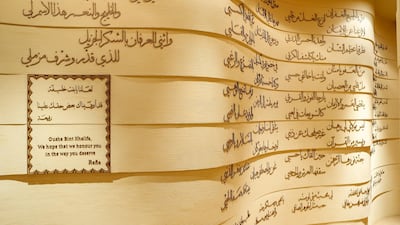Tributes, prayers and poetry were shared across the country this weekend to honour the late Ousha bint Khalifa Al Suwaidi, one of the great Nabati poets of the 20th century.
Al Suwaidi was buried in Al Quoz cemetery after Friday prayers. She was 98 years old.
She was a master of Nabati verse, a form of vernacular poetry, and her prolific writing earned her the nickname Fatat Al Arab, Girl of the Arabs.
“Our country lost a great symbol of literature, wisdom and poetry, Ousha bint Khalifa Al Suwaidi, Fatat Al Arab,” tweeted Sheikh Mohammed bin Rashid, the Vice President and Ruler of Dubai. “Fatat Al Arab has left behind treasures of literature and poetry which will continue to tell her biography and she will always be remembered.”
Al Suwaidi was born in Al Ain in 1920 at the height of the pearling boom and began composing poetry at the age of 15. Born in family that loved literature, she grew up in the company of poets and taught herself to read and write by tracing letters and words in charcoal.
_____________
Read ةore:
Legendary poet Ousha Al Suwadi dies age 98
Poetry lights up Al Dhafra festival at night
Poetry is flourishing in the UAE, says Emirati poet
_____________
In an era of great poverty and illiteracy, when few had a telephone or radio, Al Suwaidi’s poetry and fame was spread by those who memorised her poems and recited them to others. Her renown was all the more remarkable for an era when women seldom recited their poetry in public.
Much later, her poetry exchanges with Sheikh Mohammed bin Rashid were published in a weekly column in Al Bayan. In these, she offered him advice and shared her experiences.
The Arabic hashtags “Prayers for the Daughter of the Gulf” and “Prayers for Ousha bint Khalifa” were trending in the UAE on Saturday as people turned to poetry to express their adoration for the laureate.
Al Suwadi changed the very way that people spoke by reviving an interest in Emirati vernacular, poetic expression and imagery, said Sultan Al Amimi, the director of Abu Dhabi Poetry Academy.
Her poetry became lyrics for renowned singers like Mehad Hamad and in this way she brought Emirati vernacular poetry to an international audience.
“She found success not only in the UAE but also abroad and in this way she had an important role in taking local songs overseas,” said Mr Al Amimi. “She proved that women in UAE can write or recite at the same level as men. She was strong and society knew her as a poet.”
She was often simply referred to as Ousha the Poet. For the Bedouin, there was no greater praise.
“When you listen to her poetry, you live heritage,” said Saif Al Mansoori, the season six winner of Million’s Poet. “When she recites, I feel like it is my own poetry as I listen to her because she says what I feel.”

